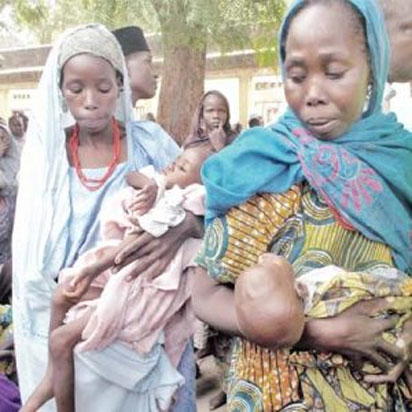By Ogalah Ibrahim
The number of severely malnourished children admitted to Médecins Sans Frontières (MSF) treatment centres in northern Nigeria has risen by 13% so far this year, fuelling fears of long-term, irreversible harm to thousands of young lives.
Between January and May 2025, MSF says it admitted nearly 24,800 children suffering from severe acute malnutrition (SAM) to its inpatient therapeutic feeding centres across seven northern states — up from about 21,900 compared to the same period last year.
MSF Doctors, in a press release issued today, warn that beyond the immediate risk to life, malnutrition can lead to lifelong physical and cognitive damage if not addressed early.
“Malnutrition is not just a short-term emergency — it is a lifelong struggle for many children,” said Dr Jamila Shuaibu Bello, an MSF doctor based in Kano. “It affects brain development, weakens immunity, and can cause chronic diseases like diabetes and hypertension later in life.”
Crisis deepens as lean season bites
MSF noted that the surge comes during Nigeria’s annual “lean season” — the months before harvest when food stocks run low and prices rise
In addition to the nearly 25,000 children treated as inpatients, MSF says over 107,000 severely malnourished children have been admitted to its outpatient feeding centres so far this year.
UNICEF estimates around three million children in Nigeria are now suffering from severe acute malnutrition (SAM) — up from 2.6 million last year — with 1.65 million of them in six conflict-affected northern states where MSF operates.
Beyond survival: tackling lifelong damage
According to MSF, malnutrition can severely delay motor development in young children, preventing them from reaching milestones such as crawling or walking at the usual age. Chronic malnutrition also causes stunting — a condition that affects school performance and, for girls, can lead to complications in childbirth due to smaller pelvis size. The organization cited an instance with two-year-old Ummul Khairun Mohammed in Kebbi State who is still unable to walk due to developmental delays caused by severe acute malnutrition.
To address these lasting damages malnutrition can inflict, MSF in a press release issued today said it has launched two pilot projects:
The first is a paediatric physiotherapy session launched in Kano and Katsina states with support from the MSF Foundation. Through these sessions, MSF physiotherapists train caregivers to continue guided exercises and play-based therapy at home to help restore movement and confidence.
The second intervention is a mental health support for both children and their caregivers, integrated into MSF’s malnutrition projects across several states including Zamfara, Bauchi, and Borno. Services include play therapy, counselling, and education to help families manage the emotional strain of caring for a malnourished child.
Kauna Hope Bako, MSF’s mental health supervisor in Bauchi explained that “It’s one thing to treat the child medically, and it’s another to assess which areas of development have been emotionally affected. Mental health support helps manage the child’s overall well-being.”
MSF cited an example at Unguwa Uku hospital in Kano where 13-month-old Usman Aliyu is relearning how to stand after malnutrition left him unable to crawl or walk.
“Before Usman fell ill, he could crawl and stand. But he lost those abilities due to the sickness,” explained his mother, Aisha Aliyu. “Now, after physiotherapy, he’s starting to walk again.”
Call for broader action
MSF says a holistic approach is needed to tackle malnutrition in Nigeria — addressing not only immediate treatment, but also the underlying causes such as food insecurity, disease outbreaks, and gaps in health infrastructure.
The organisation has expanded its inpatient capacity, increased outpatient services, and stepped up health education efforts in local communities. But doctors say more support from local and international partners is urgently required.
“We need to go beyond survival,” said Dr Bello. “If we don’t act now, many children will carry the consequences of this crisis for the rest of their lives.”
The post Northern Nigeria sees 13% spike in child malnutrition – MSF warns appeared first on Vanguard News.

